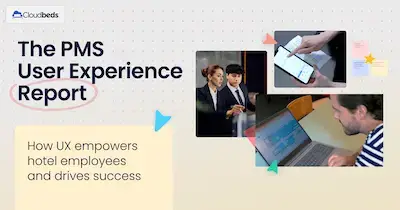Protecting your hotel
from phishing attacks
Imagine a front desk agent receives an urgent email from an online travel agency claiming that the property has been delisted due to a few negative reviews. The message includes a link to “check and verify the review” to restore visibility.
The branding looks perfect, and the tone is authoritative. Panicked about lost bookings on a key channel, the employee clicks the link and enters their login details—unknowingly handing them over to a cybercriminal. Within minutes, the property’s real account is compromised, and sensitive data is at risk.
These types of phishing attacks are increasingly common in hospitality, where the fast-paced environment, high staff turnover, and sensitive information create a perfect target for cybercriminals.
Phishing is a type of cyberattack in which criminals impersonate legitimate individuals or organizations to trick recipients into sharing sensitive information, clicking malicious links, or downloading malware. These attacks are typically delivered via email, text messages (known as smishing), phone calls (vishing), or social platforms. The goal is to use urgency, fear, or curiosity to manipulate human behavior to gain access to confidential information or systems. For hotels, phishing can compromise staff credentials, guest payment data, reservation systems, or vendor relationships. What is phishing?
In the age of AI, these attacks are becoming more sophisticated. At one time, phishing attempts were full of spelling mistakes and other obvious clues, but today they’ve become harder to detect.
Recently, Microsoft Threat Intelligence identified a phishing campaign where scammers impersonated Booking.com to target hotels. These attackers sent emails referencing negative guest reviews or urgent account verifications, tricking staff into clicking malicious links that installed credential-stealing malware.
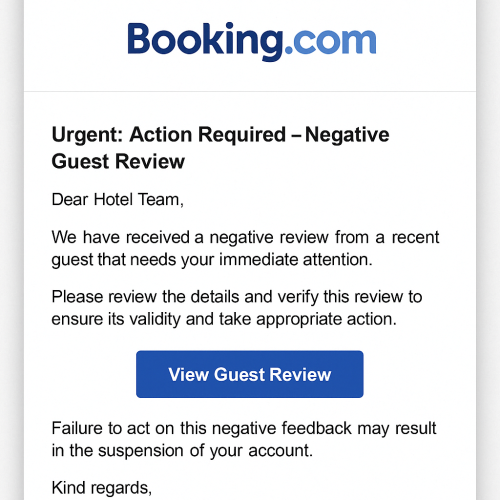
Why hotels are prime targets for phishing
In 2024, phishing attacks doubled, with credential-based phishing surging by 703%. Hotels are prone to phishing attacks due to:
- High turnover: Frequent changes in personnel can lead to inconsistent training
- Reliance on email: Hotels use email for reservations, confirmations, and vendor communication
- Valuable data: Hotels store sensitive guest information, including payment details
- A guest-first mindset: Hotel staff are trained to prioritize guest experience above all else, so when a request seems urgent, employees may act quickly to resolve it without stopping to verify legitimacy.
Common phishing attacks in hotels
Phishing is an unfortunately all too common occurrence for hotels. Here are some of the most common scenarios.
1. Business email compromise
Business email compromise (BEC) attacks are when cybercriminals pose as hotel executives (like managers or investors) or trusted vendors, requesting urgent financial transactions or sensitive information. These emails often exploit the authority of the sender to pressure employees to take action quickly, by clicking a malicious link or downloading an attachment.
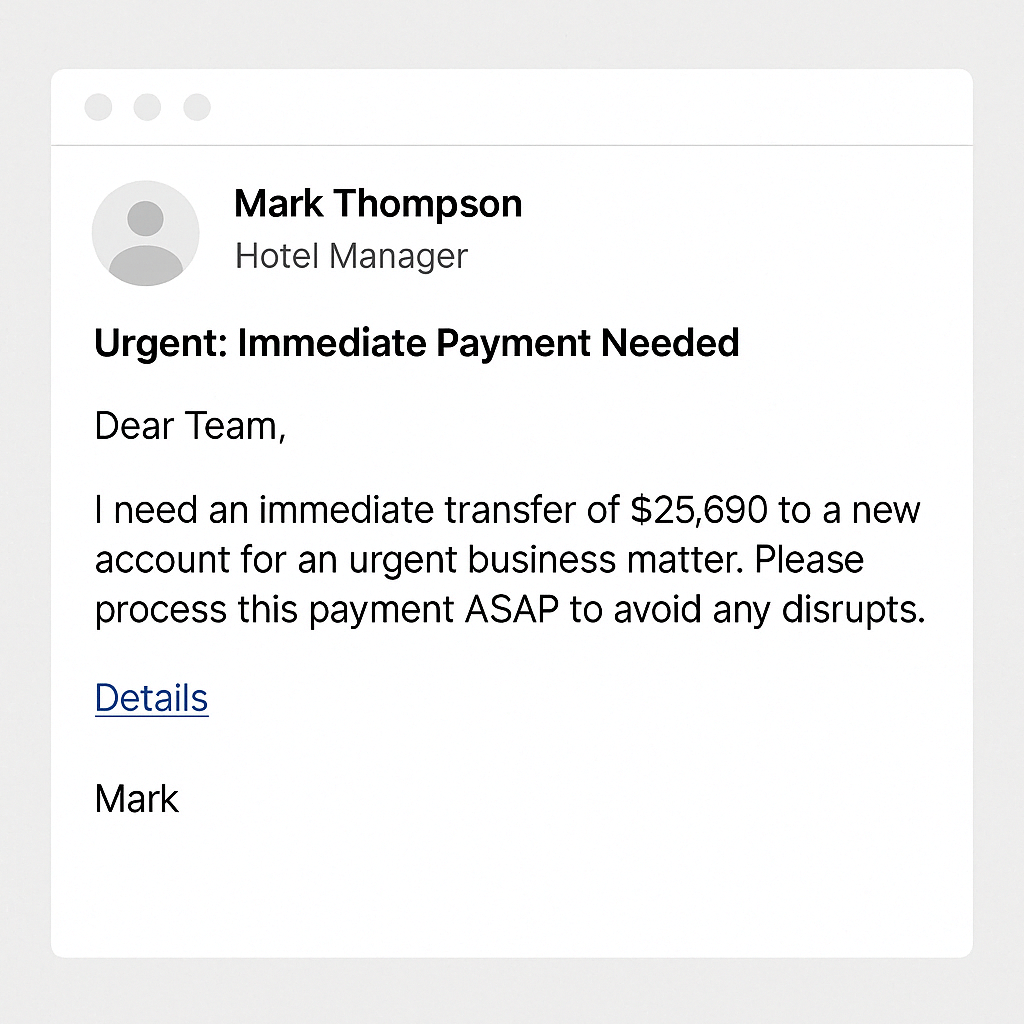
2. Fake booking confirmations
Cybercriminals will send fake booking confirmations or cancellations to guests, directing them to fraudulent websites to re-enter their payment details. Guests may arrive believing their reservation is paid for, only to learn they’ve been scammed—leaving hotels in a difficult position and damaging trust.
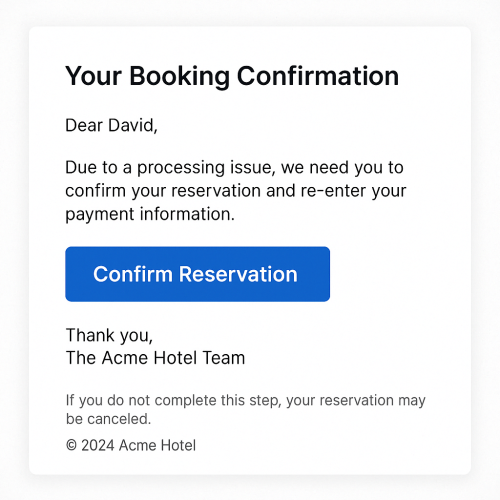
3. Vendor impersonations
Scammers will impersonate legitimate service providers, sending invoices or payment requests to different departments. Without proper verification, hotels may unwittingly transfer funds to fraudulent accounts.
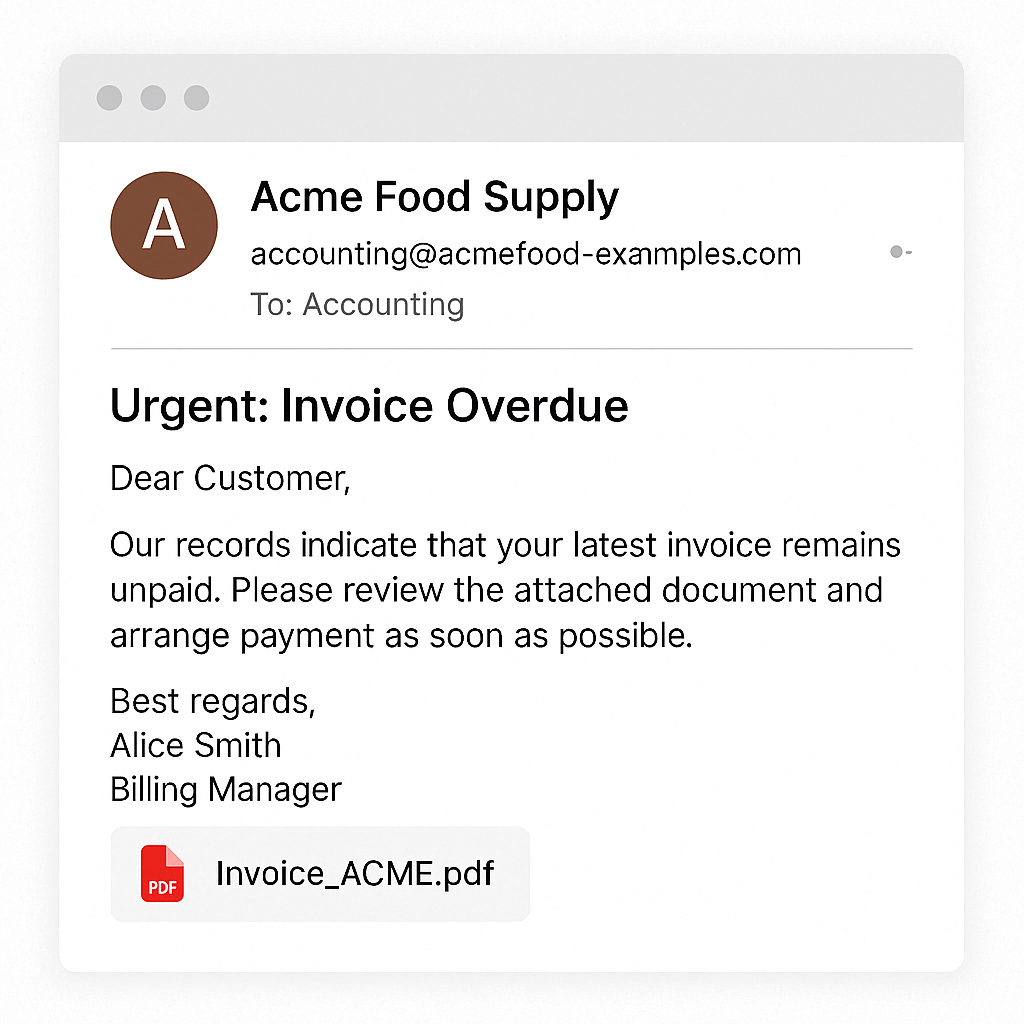
Training hotel staff to recognize phishing attempts
The number one protection against phishing attempts is educating your team on how to recognize and respond to suspicious messages. To do this:
Implement regular cybersecurity training
Implement ongoing training programs to educate staff about the latest phishing tactics and how to recognize them. Be sure to make cybersecurity a regular topic in staff meetings. Even short, 5-minute reminders on common red flags can keep awareness high.
Some free or low-cost cybersecurity training resources include:
Send simulated phishing exercises
Conduct periodic phishing simulations to test employee awareness and reinforce training. You can use one of the tools mentioned above, or create your own simulation by sending a test email from a mock domain, including common red flags like fake urgency and suspicious links or attachments.
After each simulation, review what went wrong and share learning points. Be sure to avoid shaming and instead, focus on education and creating a culture where asking questions is encouraged.
Establish a clear reporting process
Phishing emails will happen—what matters most is how your staff responds. Hotels need a simple, documented reporting process so employees know what to do if they suspect something is off.
Some tips include:
- Designate a point of contact from either security or management as a go-to for reporting phishing attempts
- Create a shared report channel – either a dedicated email address (like security@hotelname.com) or an internal messaging system
- Train staff to report immediately, even if they’re unsure
Protecting guests from phishing attempts
Protecting your guests from phishing is a little bit trickier than staff since you can’t have regular training sessions. Instead, try implementing the following tactics:
Have clear communication
Be clear—on your website, in confirmation emails, and at check-in—about how your hotel will communicate with guests – and, just as importantly, what you’ll never ask for.
For example, you could include a short note saying: “We will never ask for your credit card number over email or text. If you receive a suspicious message about your reservation, please contact our front desk directly.”
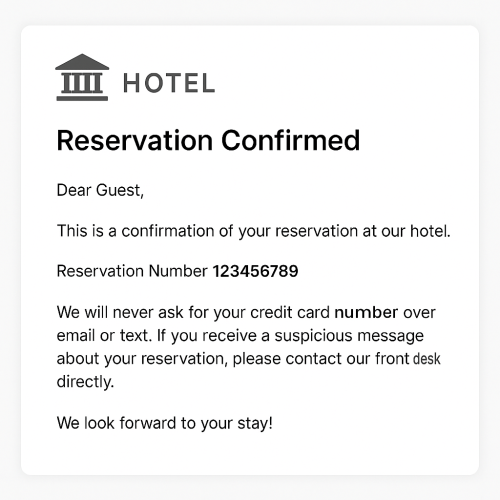
Use secure channels
Hotels should always send messages through verified email domains and SMS platforms. Generic email providers (like Gmail or Yahoo) increase the risk of impersonation. Ensure your transactional messages use branded, professional templates that are easy to recognize.
When possible, encourage communication through centralized tools like your booking engine portal or messaging software. These platforms reduce the chance of external interference.
Implement safety measures
Hotels must take proactive steps to ensure their own systems aren’t creating vulnerabilities. Strengthening your internal security posture doesn’t require a massive investment—many of the most effective measures are simple and quick to implement.
Start with your website and booking infrastructure:
- Use HTTPS encryption across your website
- Ensure PCI DSS compliance for all online booking and payment platforms
- Use tokenized payment processing to reduce the risk of data exposure
Next, tighten security around employee access and system usage:
- Enable multi-factor authentication (MFA) on all critical systems, including your PMS, OTA extranets, and internal email accounts. If login credentials are compromised in a phishing attack, MFA adds an essential second layer of protection.
- Apply the principle of least privilege, meaning only grant access to systems (like PMS or OTA portals) to employees who truly need it. Revoke access immediately when roles change or employment ends.
Finally, monitor your online presence and report impersonation:
- Regularly search for spoofed websites or fake OTA listings pretending to be your hotel
- Report suspicious domains or phishing ads to your domain host, OTA partner, or cybersecurity provider
These safeguards—when applied consistently—can significantly reduce the risk of phishing-related breaches and help protect your hotel’s systems, revenue, and reputation.
Building a culture of vigilance
Phishing scams are evolving fast, but your hotel doesn’t have to be an easy target. By investing in regular staff training, simulating phishing scenarios, and establishing clear reporting procedures, you can turn your team into a frontline defense against cybercrime.
And while you can’t train your guests in the same way, you can empower them with clear communication, secure systems, and consistent touchpoints that minimize risk. In an industry built on trust, even one fraudulent email can erode confidence and impact your bottom line.
Make cybersecurity part of your hotel’s everyday operations. With the right protocols in place, staying one step ahead of scammers is not only possible—it’s essential.


